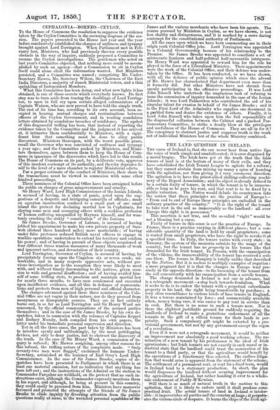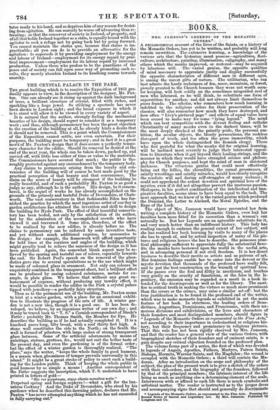THE TA ND QUESTION IN IRELAND.
TICE curse of Ireland is, that she can never hear from native lips the voice of truth simple and unadulterated; it is ever disguised by a moral brogue. The Irish have got at the truth that the false tenure of land is at the bottom of many of their evils, and they have established the Irish Tenant League to agitate for a reform ; but they cannot abstain from mixing up many a spice of humbug with the agitation, nor from giving it a very erroneous direction. The agitation is to have the priest-allied shilling-collecting machi- nery of the Repeal Association; and the object is already defined to be a certain fixity of tenure, in which the tenant is to be immove- able so long as he pays his rent, and that rent is to be fixed by a public valuation. The Nation would delude its countrymen into the notion that these principles are the practice of Europe !— " From end to end of Europe these principles are embodied in the ordinary practice of the country." "it is the right of the tenant to take root in the soil as immoveably as the landlord : all over Europe this right is in possession."
This assertion is not true, and the so-called " right " would be not a blessing but a curse.
Fixity of tenure in this sense is not the practice of Europe. In France, there is a practice varying in different places; but a con- siderable quantity of the land is held by small. proprietors ; some is rented from small proprietors, who have the right to revoke it at a specified time. In Italy, the tenure varies with every state : in Tuscany, the system of the mezzaria subsists by the usage of the country, but the tenant has no property in his tenure hie that demanded for the Irish tenant. In Prussia, with the emancipation of the villeins the immoveability of the tenant has received a seri- ous blow. The tenure in Hungary is totally unlike that described by the Nation. But it is useless to multiply examples of negation : a more pregnant fact it is that the changes in Europe tend pre- cisely in the opposite direction—to the loosening of the tenant from the soil concurrently with his emancipation from a servile tenure. The change demanded in Ireland is not one in advance, but is a retrograde movement—a step back towards feudalism. What it seeks to do is to endow the tenant with a perpetual subordinate property in his land, the right being transferable by imrchase • a very close resemblance to various kids of base tenure in England.. It was a tenure maintained by force ; and commercially available when, money being rare, it was easier to pay rent in service than in cash. But there is no sense in such a tenure now. Nor is there the slightest justifiable ground for suddenly requiring the landlords of Ireland to make a gratuitous endowment of all the tenants in the gift of a villein tenure for their lands in per- petuity. Such a compulsory gift might be extorted by a pro- visional government, but not by any government except the organ of a revolution.
Even if it were not a retrograde movement, it would be neither an improvement nor absolutely a good working scheme. The no- mination of a new tenant by his predecessor is the ideal of Irish agrarianism ; butIrish tenants are not exactly in such moral or in- dustrial state that the landlord could trust the nomination of his
tenant to a third party, or that the agriculture would benefit by the operations of a functionary thus selected. The endless litiga- tion that would arise is apparent from the statement of the scheme. The settlement of a permanent rent, or rent for a fixed term, would in Ireland tend to a stationary production. In short, the plan would dispossess the landlord without securing improvement for the agriculture of Ireland, but rather hending it over to a whole- sale endowment of Paddy-3Pliewism.
Still there is so much of natural truth in the motives to this
agitationthat it is likely to endure until it shall produce some practical'fruit The actual tenure of land in Ireland i9 intake- able: it impoverishes all parties and the country atlarge ; it perletue ates the vicious circle of despairs. It burns the ships of the Irieh agx- tator ready to his hand, and so deprives him of any reason for desist- ing from agitation. He can warmly be worse off advancing than re- treating; so that the conserver of society in Ireland, of property, and ofall that holds Ireland together as a state, is equally bound with the agitator to seek a refuge not by going back but by going forward. You cannot maintain the status quo, because that status is im- practicable; all you can do is to provide an alternative for the agitation: to supersede it by providing employment for the energy and labour of Ireland—employment for its energy repaid by prac- tical improvement—employment for its labour repaid by increased production. -Unless those who profess to be the guardians of the peace and of society can fall upon some way of promoting such re- sults, they merely abandon Ireland to its headlong course towards anarchy.



























 Previous page
Previous page